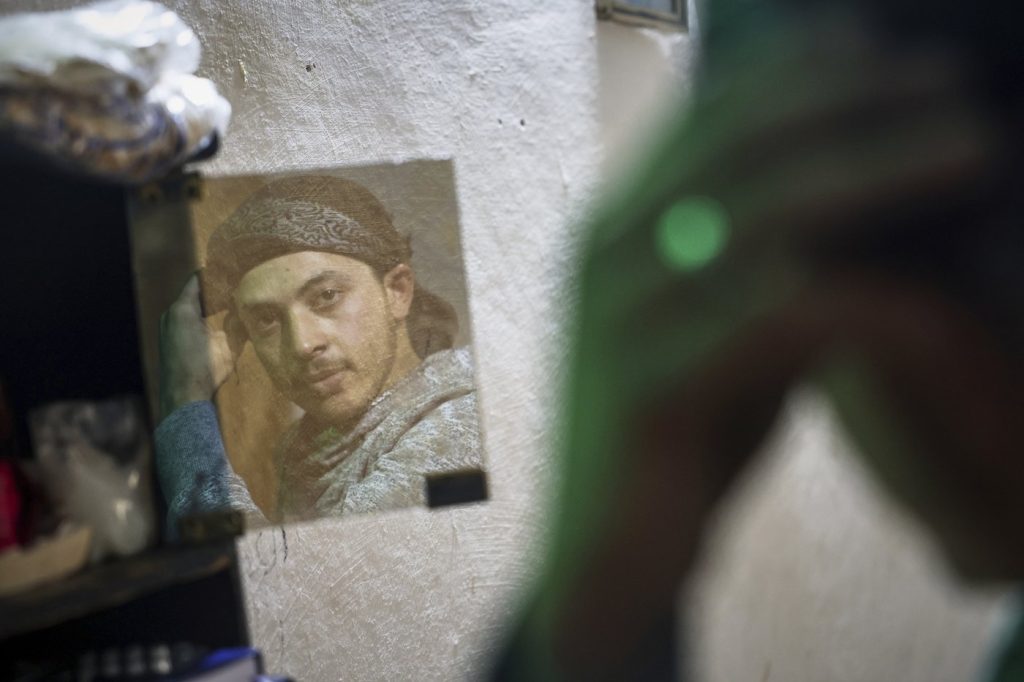IDLIB, Syria (AP) – Suleiman Khalil, a 21-year-old olive harvester from Qaminas village in Syria’s Idlib province, was left with life-altering injuries after stepping on a land mine four months ago. Harvesting olives with two friends, Khalil was unaware of the dangers lying beneath the soil. When they noticed a visible mine, panic ensued, resulting in Khalil stepping on the explosive, which detonated. His friends fled for help, but he thought they had abandoned him.
Khalil recalls the terrifying moment, stating, “At first, I thought I’d died. I didn’t think I would survive this.” The first explosion severely wounded his left leg, while the second one, which detonated shortly after, resulted in the loss of his right leg above the knee. He managed to apply a makeshift tourniquet with his shirt and screamed for help until a nearby soldier rescued him. Four months post-incident, Khalil struggles with the psychological impact and physical challenges of his amputation, while dreaming of obtaining a prosthetic limb to return to work and support his family.
Despite the Syrian civil war’s apparent end with the fall of Bashar Assad on December 8, remnants of war persist, continuing to cause loss and injury. Reports indicate that since that date, land mines and explosive remnants have killed at least 249 individuals, including 60 children, and injured an additional 379. The widespread use of these mines by the Syrian government, its allies, and armed opposition groups has contaminated vast areas, particularly in former front-line regions like rural Idlib, which have only recently become accessible, leading to an increase in casualties.
Prior to the war's de-escalation, civilians returning home often fell victim to these remnants while attempting to reclaim their agricultural lands. Richard Weir, a senior researcher at Human Rights Watch (HRW), warns that without urgent clearance efforts across Syria, returning civilians will continue to be at risk. Experts estimate there are still tens of thousands of land mines buried underground, with Ahmad Jomaa, a demining unit member, stating that it will take ages to clear them all.
Farming in rural Idlib remains the main source of income for many residents, intensifying the danger posed by land mines. The issue has reached a critical point, with a tractor explosion injuring several farm workers recently. Jomaa pointed out the extreme risk faced by farm workers as most of the mines are designed to target individuals and light vehicles. Unfortunately, many deminers have also suffered casualties; approximately 15 to 20 have lost limbs during their work, and several have been killed. The lack of advanced detection equipment further compounds the problem, as although some mines are visible, many remain hidden.
In addition to the physical dangers, land mines cause significant psychological trauma. They displace families, destroy property, and limit access to essential services. HRW has called for the establishment of a civilian-led mine action authority to work alongside the UN Mine Action Service (UNMAS) to enhance demining operations. The Assad regime had previously laid these explosives to deter opposition fighters but made little effort to clear the mines afterward, leaving rural residents in constant peril.
The tragic story of Mohammad, a former Syrian Republican Guard member, exemplifies the dangers faced by those attempting to dismantle the mines. Mohammad, 39, died while demining an area in Idlib, despite being trained in handling explosives. His brother, Salah Sweid, lamented the continual loss of life, stating, “Every day someone is dying.” Mohammad’s tragic end highlights the ongoing risks associated with the remnants of war, as both deminers and civilians continue to face threats from buried explosives.
Just three days after the government’s collapse, another young man, Jalal al-Maarouf, lost his leg to a mine while tending to his goats. The costs of prosthetics exceed $3,000, placing them beyond the financial reach of individuals like Jalal. His plight, along with Khalil’s and countless others affected, underscores the dire and unresolved issue of land mines in Syria.










